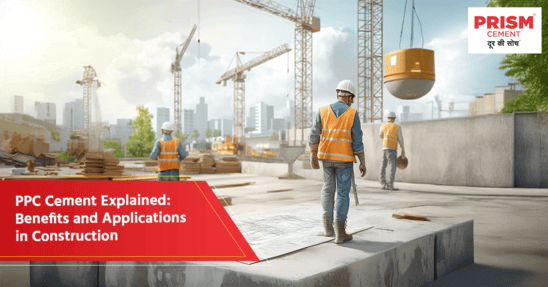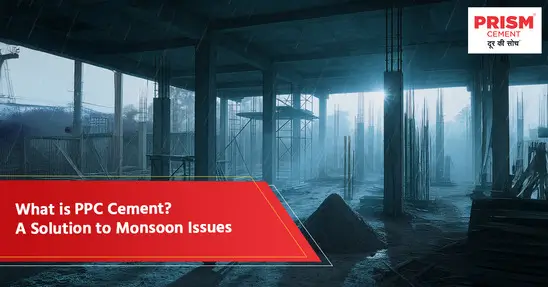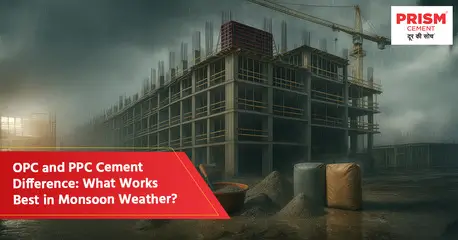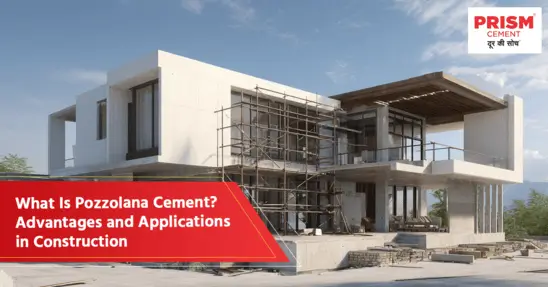Cement is a cornerstone of modern construction, offering strength and durability to countless structures. Among the many types of cement for construction, Portland Pozzolana Cement (PPC) stands out for its exceptional performance, sustainability and cost-effectiveness. This blog explores what PPC cement is, its types, manufacturing process, applications, properties, and advantages to help you make an informed choice for your construction needs.
What Is Portland Pozzolana Cement (PPC)?
Portland Pozzolana Cement (PPC) is a blended cement made by mixing Portland cement clinker, pozzolanic materials (like fly ash, volcanic ash or calcined clay), and gypsum. The pozzolanic materials react with calcium hydroxide to enhance the cement’s strength and durability over time.
Known for its sustainability and resistance to chemical attacks, PPC cement is an ideal choice for structures exposed to harsh environments or requiring long-term strength. It is increasingly popular due to its affordability and eco-friendliness, making it a favourite cement product for infrastructure and housing projects.
Types of Portland Pozzolana Cement
Fly Ash-Based PPC
Fly ash, a by-product of coal-fired power plants, is the most commonly used pozzolanic material in PPC cement manufacturing. Fly ash-based PPC offers improved workability and is highly resistant to sulfate attacks, making it ideal for marine and industrial structures.
Calcined Clay-Based PPC
This type of Portland Pozzolana Cement uses calcined clay as a pozzolanic material. It provides excellent durability and is suitable for projects requiring high resistance to alkali-silica reactions, such as dams, bridges and industrial structures.
What Is the Manufacturing Process of Portland Pozzolana Cement (PPC)?
The PPC cement manufacturing process involves:
- Grinding Portland cement clinker into fine powder
- Adding pozzolanic materials like fly ash or calcined clay
- Incorporating gypsum to control the setting time
- Blending the components thoroughly to achieve a uniform product
This process ensures that PPC cement offers enhanced properties, such as reduced heat of hydration and improved resistance to chemical attacks.
What Are the Key Applications of PPC Cement?
PPC cement use is versatile and spans various construction projects, including:
- Residential and commercial buildings
- Marine structures and bridges exposed to moisture
- Dams, canals, and water-retaining structures
- Road pavements and precast concrete products
Its adaptability and long-term strength make PPC cement an ideal choice for diverse applications.
What Are the Properties of PPC Cement?
- Strength Development: Gains strength gradually over time, ensuring durability
- Low Heat of Hydration: Reduces the risk of thermal cracking in large structures
- High Workability: Improves ease of application and reduces wastage
- Chemical Resistance: Resists sulfate and chloride attacks, making it suitable for aggressive environments
- Sustainability: Less CO₂ emissions during production, making it an eco-friendly cement product
Advantages of Portland Pozzolana Cement
- Cost-Effective: PPC cement price is generally lower than other types of cement for construction, offering better value for money
- Enhanced Durability: Provides superior resistance to chemical attacks and moisture ingress, extending the life of structures
- Environment-Friendly: The use of pozzolanic materials minimizes the carbon footprint of cement manufacturing
- Crack Resistance: Generates low heat during setting, reducing the risk of shrinkage cracks
- Versatile Applications: Ideal for concrete, plaster and structural elements like beams and columns
Prism Champion All Weather Cement, a premium offering from Prism Cement, exemplifies these benefits. With built-in water-repellent properties and high strength, it ensures moisture-resistant, durable, and beautiful structures that stand the test of time.
Conclusion
Whether you’re building a residential home or a large infrastructure project, PPC cement offers a blend of performance, affordability and sustainability. Its resistance to chemical attacks, eco-friendliness and cost-effectiveness make it an indispensable construction cement. For exceptional results, consider Prism Champion All Weather Cement, trusted for long-lasting performance across all weather conditions.
FAQs
Q1. How should PPC cement be stored?
Answer: Store it in a dry, moisture-free area on wooden pallets, away from direct contact with the ground.
Q2. What is the difference between OPC, PPC, and PSC?
Answer: OPC is plain Portland cement, PPC contains pozzolanic materials, and PSC includes slag for enhanced durability.
Q3. What is the role of gypsum in cement?
Answer: Gypsum regulates the setting time of cement and prevents it from hardening too quickly.
Q4. How is concrete made?
Answer: Concrete is made by mixing cement, water, sand, and aggregates in specific proportions.
Q5. Why is water necessary in concrete?
Answer: Water activates the chemical reactions in cement, binding aggregates, and sand to form a strong, durable material.




